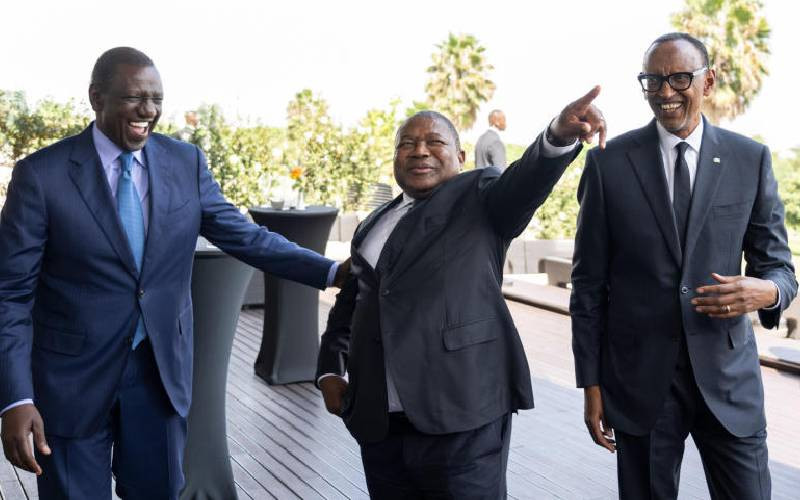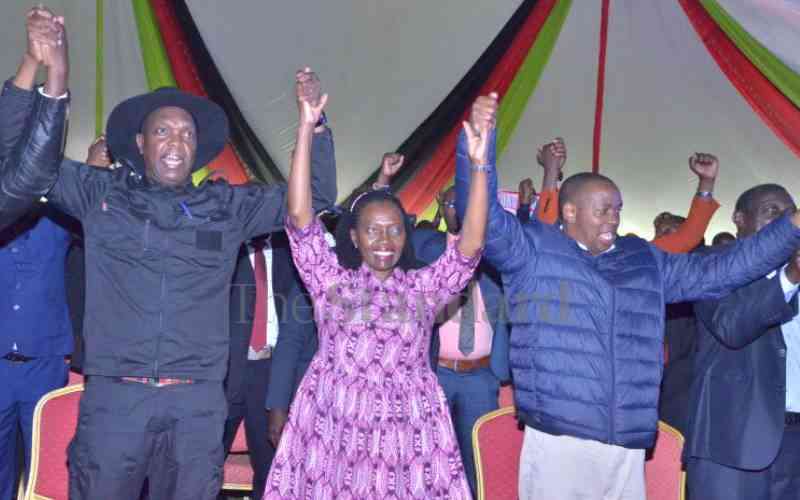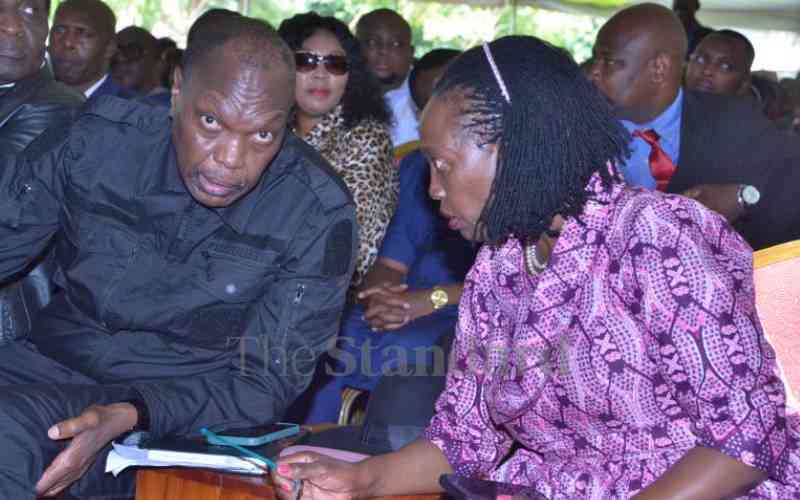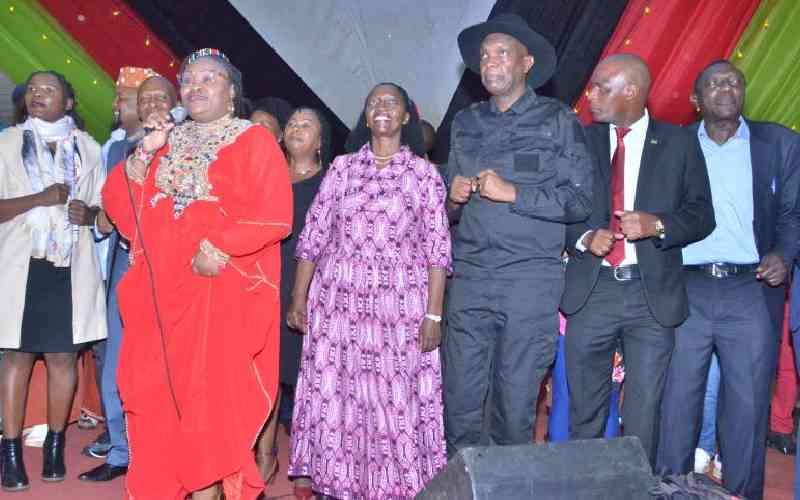By KENNETH KWAMA
The man who invented the vuvuzela, Freddie Maake is a poor chap who lives in a cramped house with his nine children in a slum area referred to as Tembisa, near Johannesburg.
Maake who uses the nickname Saddam, a reference to the former Iraqi dictator, has been struggling to put food on the table even after the world embraced his invention at the June/July World cup in South Africa.
"I’m a man who loves a challenge. That’s why they call me Saddam. I love Saddam Hussein because he died protecting his country. I’m also protecting my country," he told South Africa’s daily, Mail & Guardian during a past interview.
The metre-long plastic horn blown by South African football fans is loved and hated in equal measure for the blaring sounds that many have compared to a herd of elephants or hives of angry bees.
According to the Mail & Guardian, finding Maake’s house is not difficult, even in the crowded suburb of Tembisa.
"It is the one with a giant Kaizer Chiefs (football club in SA) flag at the gate. The lounge resembles a football museum, dominated by Amakhosi artifacts, which include more than 200 helmets, known as amakaraba, all types of vuvuzelas, flags, scarves, posters and pictures," states the paper.
no gains
While various manufacturers have been cashing in on the fame of Maake’s invention to sell the instrument to hundreds of thousands of football supporters, the man who claims he invented it says he has never received anything.
The football fan told www.guardian.co.uk that he created the vuvuzela prototype in the mid-70s and developed versions in aluminium and plastic.
In 2001, a company trademarked it and mass-produced it. Maake reportedly asked for royalties, but the talks broke down.
The company, Masincedane Sport, denied entering any such negotiations with Maake. Instead, it developed a three-piece vuvuzela for the World Cup and speculated it would face fierce competition for profits from unofficial rivals before the world cup, which it did.
The vuvuzela came to international prominence during last year’s Confederations Cup in South Africa. Several players complained that they could not hear each other on the pitch. Later, the Japanese football association called for it to be banned.
However, the fans have not been getting enough of the instrument, which costs between 30 Rands (Sh300) and 65 Rands (Sh650).
Maake, a devotee of the Kaiser Chiefs football club, told www.guardian.co.uk that he has a vuvuzela next to him when he sleeps and wants it to be blown at his funeral.
Stay informed. Subscribe to our newsletter
He was once barred from taking one on a plane to a football match in neighbouring Zimbabwe and refused to fly.
endured suffering
"This is my invention and it saddens me that other people are benefiting from all the suffering I have endured in popularising the vuvuzela. I was locked up for 20 minutes at the airport when I insisted on flying to Zimbabwe with my vuvuzela in 1992. I was determined to blow it as I boarded the plane, because it was the first time I flew."
Maake, who says he came up with the name vuvuzela in 1994, said in 2001 Masincedane Sport, based in Cape Town, trademarked the plastic vuvuzela.
He claims he was invited to make a deal, but the meeting never happened.
"I don’t mind taking the idea, but why do they put the vuvuzela name on the brand? I get no royalties from those kinds of things." The money is sent to Cape Town and Saddam doesn’t get any.
"I went to Safa (the South African Football Association), I complained and nobody listened. I’m not going to get a lawyer because I don’t have the money," he laments.
Maake, who is unemployed, had aimed to make some money during the World Cup by selling his vuvuzela CD, but this never made him any fortunes. His hopes that he could be used as a celebrity fan in adverts also went belly up.
During a past interview with Mail & Guardian, he pointed at the first picture taken in the 1970s, of him holding a long aluminium vuvuzela.
dangerous weapon
"This is the father of all the vuvuzelas you see today," Maake said. The instrument was banned from the stadium as authorities ruled that it was a dangerous weapon. The inventor admitted to having used it once or twice in scuffles with rival fans and feels the ban was justified.
Despite Maake’s claims, the question of who owns the rights to the vuvuzela appears destined to remain unanswered, perhaps until it becomes irrelevant.
The company he has been tussling with for the rights — Masincedane Sport told www.guardian.co.uk that it came up with the vuvuzela itself. Neil van Schalkwyk, its founder, is quoted saying that he developed interest after seeing a tin version of the product at the stadiums.
"With my background in plastics, I spoke to my manager about us developing a plastic version in 1999. The first samples were made in 2001 and we started getting the product out into the market," he said.
Van Schalkwyk denied meeting Maake in 2001. "I only really heard about him in 2004 when there was a lot of media interest in the vuvuzela and he came forward saying all that stuff, but I don’t think he has a leg to stand on."
They did meet that year, Van Schalkwyk continued, but only for a store promotion. Van Schalkwyk told the newspaper that Masincedane Sport, with a partner company in Germany, was working on a vuvuzela in three parts that click together.
"If things work out well and our market is protected, we will strongly consider giving him (Maake) some kind of financial compensation as a matter of principle for he was always involved down the line in the football. But up front I can’t make some type of commitment to him when I do not even know if it’s actually going to be that successful."
 The Standard Group Plc is a
multi-media organization with investments in media platforms spanning newspaper
print operations, television, radio broadcasting, digital and online services. The
Standard Group is recognized as a leading multi-media house in Kenya with a key
influence in matters of national and international interest.
The Standard Group Plc is a
multi-media organization with investments in media platforms spanning newspaper
print operations, television, radio broadcasting, digital and online services. The
Standard Group is recognized as a leading multi-media house in Kenya with a key
influence in matters of national and international interest.
 The Standard Group Plc is a
multi-media organization with investments in media platforms spanning newspaper
print operations, television, radio broadcasting, digital and online services. The
Standard Group is recognized as a leading multi-media house in Kenya with a key
influence in matters of national and international interest.
The Standard Group Plc is a
multi-media organization with investments in media platforms spanning newspaper
print operations, television, radio broadcasting, digital and online services. The
Standard Group is recognized as a leading multi-media house in Kenya with a key
influence in matters of national and international interest.





